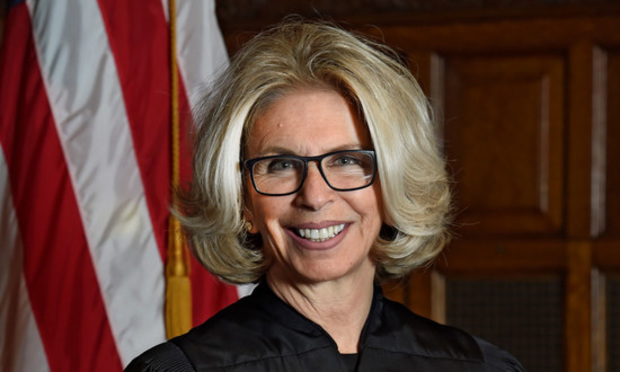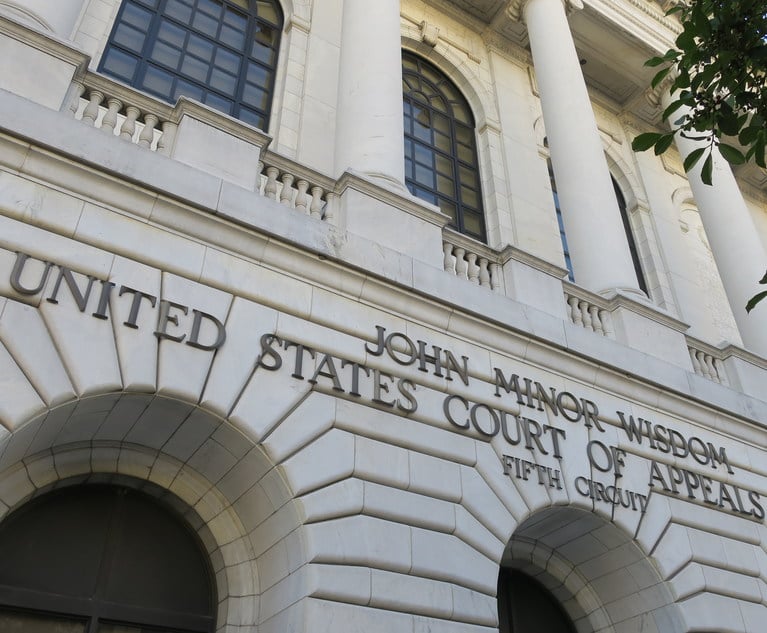High Court Allows NYPD to Evade Acknowledging Whether They Have Information About Muslim Surveillance
In a 4-3 decision, the majority ruled that the NYPD was within its rights to give a nonresponse when it received Freedom of Information Law requests from two Islamic men who wanted records tied to possible police surveillance.
March 29, 2018 at 08:55 PM
6 minute read
 Chief Judge Janet DiFiore
Chief Judge Janet DiFiore In a ruling that straddles the intersection of the public's right to know and counterterrorism secrecy, New York's highest court on Thursday decided that the New York City Police Department can legally evade questions about whether it has records relating to the surveillance of Muslim groups.
In a 4-3 decision, the majority court ruled that the NYPD was within its rights to use the so-called Glomar response when it received Freedom of Information Law requests from two Islamic men in 2012 who wanted records tied to any police surveillance of them or their mosque or student association.
The “Glomar response”—named after a secrecy tactic first used by the CIA during the 1970s—is essentially a nonresponse. The NYPD, which has begun using it on rare occasions, will avoid giving FOIL-requested answers and instead simply state that it “can neither confirm nor deny” the existence of the investigation or effort being asked about.
In Thursday's majority decision, Chief Judge Janet DiFiore wrote that the case presented the issue of whether a government agency in New York State may decline to acknowledge that FOIL-requested records exist if giving such a response protects statutorily exempted information.
Her opinion, and the judges in dissent, sought to balance FOIL's purpose of promoting open government and public accountability against what DiFiore described as the “inherent dangers of premature disclosure” that, especially in the counterterrorism context, could lead to loss of life for the public or law enforcement.
DiFiore, joined by Judges Eugene Fahey, Michael Garcia and Paul Feinman, wrote that, in the context of the NYPD's surveillance or investigation of certain Islamic people and organizations, the NYPD's nonresponsive Glomar statement made sense.
“The need for government confidentiality may be at its zenith when a law enforcement agency is undertaking a covert investigation of individuals or organizations, where the lives of the public, cooperators and undercover officers may hang precariously in the balance and the reputation, livelihood or liberty of the subject may be at stake,” she wrote.
She also knocked down plaintiffs Talib Abdur-Rashid and Samir Hashmi's argument that to avoid answering whether any records exist was to undercut the purpose of FOIL.
“Taken to its logical extreme, petitioners argue a Catch-22 paradigm where the NYPD would have to acknowledge the existence of an investigation involving a particular person notwithstanding that the contents of any responsive records would be exempt and revelation of their existence would result in the same harm—justifying exemption of the contents—whether the FOIL request comes from the target, a newspaper or some other member of the public,” she wrote.
Responses to the high-court decision came swiftly on Thursday, as Omar Mohammedi, the civil rights lawyer for Abdur-Rashid and Hashmi, as well as amicus counsel at the New York Civil Liberties Union, complained that the ruling will bolster the NYPD's penchant for secrecy in its actions.
“I am extremely disappointed, because I am really concerned not only about my clients but also about New Yorkers' welfare,” Mohammedi said in a phone interview.
Mohammedi said that he and his clients were “still considering next steps,” and he declined to say whether they will attempt to appeal Thursday's ruling.
“A Glomar response does not allow a court to do its job” in assessing a FOIL request for information, he said. “It does not even open the door. How can a court assess if what they [the NYPD] is claiming is true, that there are exempted public safety issues” tied to the requested information.
“And Glomar is a blanket objection,” he claimed, adding that “the dissenting justices were aggressive in saying that the majority had made a decision that contradicts previous precedent that blanket objections are not allowed under FOIL.”
He also said the majority had made “a policy decision” that should only be made by the Legislature.
Bobby Hodgson, an NYCLU staff attorney, joined the chorus of complaints, saying in a statement that “given the NYPD's history of spying on Muslim-Americans and political protesters, it is concerning that today's ruling opened the door to even more secrecy regarding these practices.”
But the NYPD, in its own statement, played down its use of the Glomar response.
“In a very few FOIL matters, merely confirming the existence of records that cannot be disclosed under FOIL would itself raise issues about prior or ongoing confidential law enforcement activities,” Kellyann Ort, a spokeswoman, said. She added that “to date the NYPD has rarely used the legal Glomar doctrine,” and said that “the department will continue to do so only on a very limited basis and where appropriate.”
Among the dissenting judges, Rowan Wilson, who concurred in part and dissented in part, wrote that the case should have been sent back to the trial court for more development of the record and evaluation.
“Even were the record not riddled with opportunities for further development, the appropriate remedy after resolving the thorny theoretical issue in this case of first impression would be to remit the petitions to the Supreme Court for consideration unclouded by the overarching and overwhelming question of whether an agency may ever refuse to confirm or deny the existence of responsive records. Simply put, 'we lack the benefit of an evaluation of th[ese] issue[s] by the [lower] court[s],'” he wrote, quoting Florez v. Cent. Intelligence Agency, 829 F3d 178, 183-184 (2d Cir. 2016).
Judge Leslie Stein, who dissented fully and was joined by Judge Jenny Rivera, wrote that “in my view, authorization for such [Glomar] responses cannot be found in … the language of FOIL, and the majority's determination to the contrary sanctions a blanket exemption from disclosure for a vast amount of information and records. Granting such a broad judicial exemption is at odds with the express will of the legislature.”
The dispute leading to Thursday's Court of Appeals decision began in October 2012, when Abdur-Rashid, a Manhattan resident, and Hashmi, a Rutgers University student, lodged separate FOIL requests seeking NYPD records linked to any surveillance and investigation of them as individuals or entities with which they were associated, the majority explained. Their requests and subsequent lawsuits were reportedly prompted by Pulitzer Prize-winning Associated Press reports that indicated they were the subjects of an anti-terror surveillance program.
The majority's decision Thursday affirmed an Appellate Division, First Department, opinion on the issue.
Devin Slack, a deputy chief of the city Law Department's Appeals Division, represented the police department in the appeal. A Law Department spokesman declined to comment and deferred to the NYPD's statement.
This content has been archived. It is available through our partners, LexisNexis® and Bloomberg Law.
To view this content, please continue to their sites.
Not a Lexis Subscriber?
Subscribe Now
Not a Bloomberg Law Subscriber?
Subscribe Now
NOT FOR REPRINT
© 2025 ALM Global, LLC, All Rights Reserved. Request academic re-use from www.copyright.com. All other uses, submit a request to [email protected]. For more information visit Asset & Logo Licensing.
You Might Like
View All
Standing Spat: Split 2nd Circuit Lets Challenge to Pfizer Diversity Program Proceed



Legal Issues to Watch in the US Appeals Courts in 2025
Trending Stories
- 1SDNY Criminal Division Deputy Chief Returns to Debevoise
- 2Brownstein Adds Former Interior Secretary, Offering 'Strategic Counsel' During New Trump Term
- 3Tragedy on I-95: Florida Lawsuit Against Horizon Freight System Could Set New Precedent in Crash Cases
- 4Weil, Loading Up on More Regulatory Talent, Adds SEC Asset Management Co-Chief
- 5Big Banks Did Great Last Year. What Does That Mean for Big Law?
Who Got The Work
J. Brugh Lower of Gibbons has entered an appearance for industrial equipment supplier Devco Corporation in a pending trademark infringement lawsuit. The suit, accusing the defendant of selling knock-off Graco products, was filed Dec. 18 in New Jersey District Court by Rivkin Radler on behalf of Graco Inc. and Graco Minnesota. The case, assigned to U.S. District Judge Zahid N. Quraishi, is 3:24-cv-11294, Graco Inc. et al v. Devco Corporation.
Who Got The Work
Rebecca Maller-Stein and Kent A. Yalowitz of Arnold & Porter Kaye Scholer have entered their appearances for Hanaco Venture Capital and its executives, Lior Prosor and David Frankel, in a pending securities lawsuit. The action, filed on Dec. 24 in New York Southern District Court by Zell, Aron & Co. on behalf of Goldeneye Advisors, accuses the defendants of negligently and fraudulently managing the plaintiff's $1 million investment. The case, assigned to U.S. District Judge Vernon S. Broderick, is 1:24-cv-09918, Goldeneye Advisors, LLC v. Hanaco Venture Capital, Ltd. et al.
Who Got The Work
Attorneys from A&O Shearman has stepped in as defense counsel for Toronto-Dominion Bank and other defendants in a pending securities class action. The suit, filed Dec. 11 in New York Southern District Court by Bleichmar Fonti & Auld, accuses the defendants of concealing the bank's 'pervasive' deficiencies in regards to its compliance with the Bank Secrecy Act and the quality of its anti-money laundering controls. The case, assigned to U.S. District Judge Arun Subramanian, is 1:24-cv-09445, Gonzalez v. The Toronto-Dominion Bank et al.
Who Got The Work
Crown Castle International, a Pennsylvania company providing shared communications infrastructure, has turned to Luke D. Wolf of Gordon Rees Scully Mansukhani to fend off a pending breach-of-contract lawsuit. The court action, filed Nov. 25 in Michigan Eastern District Court by Hooper Hathaway PC on behalf of The Town Residences LLC, accuses Crown Castle of failing to transfer approximately $30,000 in utility payments from T-Mobile in breach of a roof-top lease and assignment agreement. The case, assigned to U.S. District Judge Susan K. Declercq, is 2:24-cv-13131, The Town Residences LLC v. T-Mobile US, Inc. et al.
Who Got The Work
Wilfred P. Coronato and Daniel M. Schwartz of McCarter & English have stepped in as defense counsel to Electrolux Home Products Inc. in a pending product liability lawsuit. The court action, filed Nov. 26 in New York Eastern District Court by Poulos Lopiccolo PC and Nagel Rice LLP on behalf of David Stern, alleges that the defendant's refrigerators’ drawers and shelving repeatedly break and fall apart within months after purchase. The case, assigned to U.S. District Judge Joan M. Azrack, is 2:24-cv-08204, Stern v. Electrolux Home Products, Inc.
Featured Firms
Law Offices of Gary Martin Hays & Associates, P.C.
(470) 294-1674
Law Offices of Mark E. Salomone
(857) 444-6468
Smith & Hassler
(713) 739-1250






